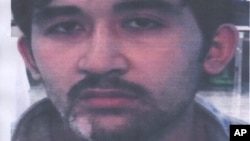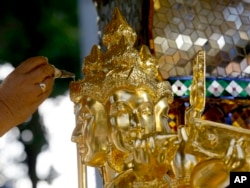Thai police say a man arrested earlier this week near the country's border with Cambodia did not likely carry out the bombing at a Bangkok shrine that killed 20 people.
The DNA taken from the suspect, identified as Yusufu Mieraili, does not match the DNA found at the blast site, said National Police spokesman Prawut Thavornsiri on Friday.
However the spokesman also said Mieraili is "definitely involved in the bombing," noting his DNA was found in an apartment where a large amount of bomb-making materials were seized.
The discovery appears to be another setback in the investigation into who carried out the August 17 blast, Thailand's deadliest ever terror attack.
Thai Prime Minister Prayuth Chan-ocha had described Mieraili as a "main suspect" and insisted he matched the description of a man seen in surveillance footage walking away from the shrine moments before the blast.
Thai authorities have said Mieraili is a foreigner, but have not commented on his nationality or confirmed the authenticity of a Chinese passport reportedly found in his possession issued to Yusufu Mieraili, 25, born in Xinjiang, China.
“We have agreed already that I won't mention the name of a country, the name of a group or their religion. Please allow me to say that it is a network, and let's wait and see which group it is,” Prawut said Thursday when asked if the case was linked to Uighurs.
Police have also arrested at least one other foreigner, identified as Adem Karadak, and a Thai Muslim, Kamarudeng Saho. At least eight arrest warrants have also been issued.
Public confidence in the investigation has been undermined by contradictory information issued by authorities, and suspicions about transparency in a country under military control and a notoriously corrupt police force.
Thai officials have told reporters that they have been ordered not to characterize the bombing as a terrorist attack so as not to harm Thailand's important tourism industry, and in view of the closer relationship with China since last year's coup in the kingdom.
The public is being cautioned daily not to spread rumors on social media about the bombing while being assured by the junta that those investigating “are capable personnel and experts who are putting their best efforts in cautiously solving the case.”
Thai media, for the first time, however, are now openly drawing a possible link between the deadly bombing and Thailand's deportation in July of more than 100 ethnic Uighurs. Following their forcible return to China, violent protests in Istanbul targeted the Thai and Chinese missions.
Uighurs are related to Turks, and Turkey is home to a large Uighur community. The Erawan Shrine is especially popular with Chinese tourists, feeding the speculation that it could have been targeted by people who believe the Uighurs are oppressed by China's government.
China has alleged that the repatriated Uighurs included some who intended to join Islamic State fighters in Syria.
Thai security officials have suggested the suspects are part of a human trafficking ring with a grudge against Thailand. However, Thai Prime Minister Prayuth Chan-ocha, known for his outspokenness, has stretched the theory to acknowledge it could have been a gang involved in smuggling Uighurs out of China.
The Turkish Embassy in Bangkok issued a statement Thursday saying it has not received confirmation from Thai authorities about the suspects' nationalities.
The embassy statement highlighted the confusion surrounding the ongoing investigation, in which police say they seized more than 200 fake Turkish passports.
“There is no clear information on the issue,” a spokesman was quoted as saying, urging Thai authorities to “provide clear and correct information.”
Shrine restored
On Friday, Thai authorities unveiled the restored centerpiece of the Erawan Shrine, in the latest bid to boost confidence among Bangkok's tourism and business communities almost three weeks after a deadly bombing that left 20 dead.
“The most important issue for the country's image is to restore confidence about safety,” Minister of Culture Vira Rojpojchanarat told reporters at Friday's ceremony. He said it was intended to “create confidence and raise the morale of [Thai] people and tourists.”
The ministry's Fine Arts Department repaired 12 areas of the shrine's gleaming golden statue of the Hindu god Brahma that were damaged by the attack, notably on its four-headed face where a chin was blasted out, Vira said.
“Every day the police and national security are making progress on the case,” Vira added.
Some material for this report came from the Associated Press.










